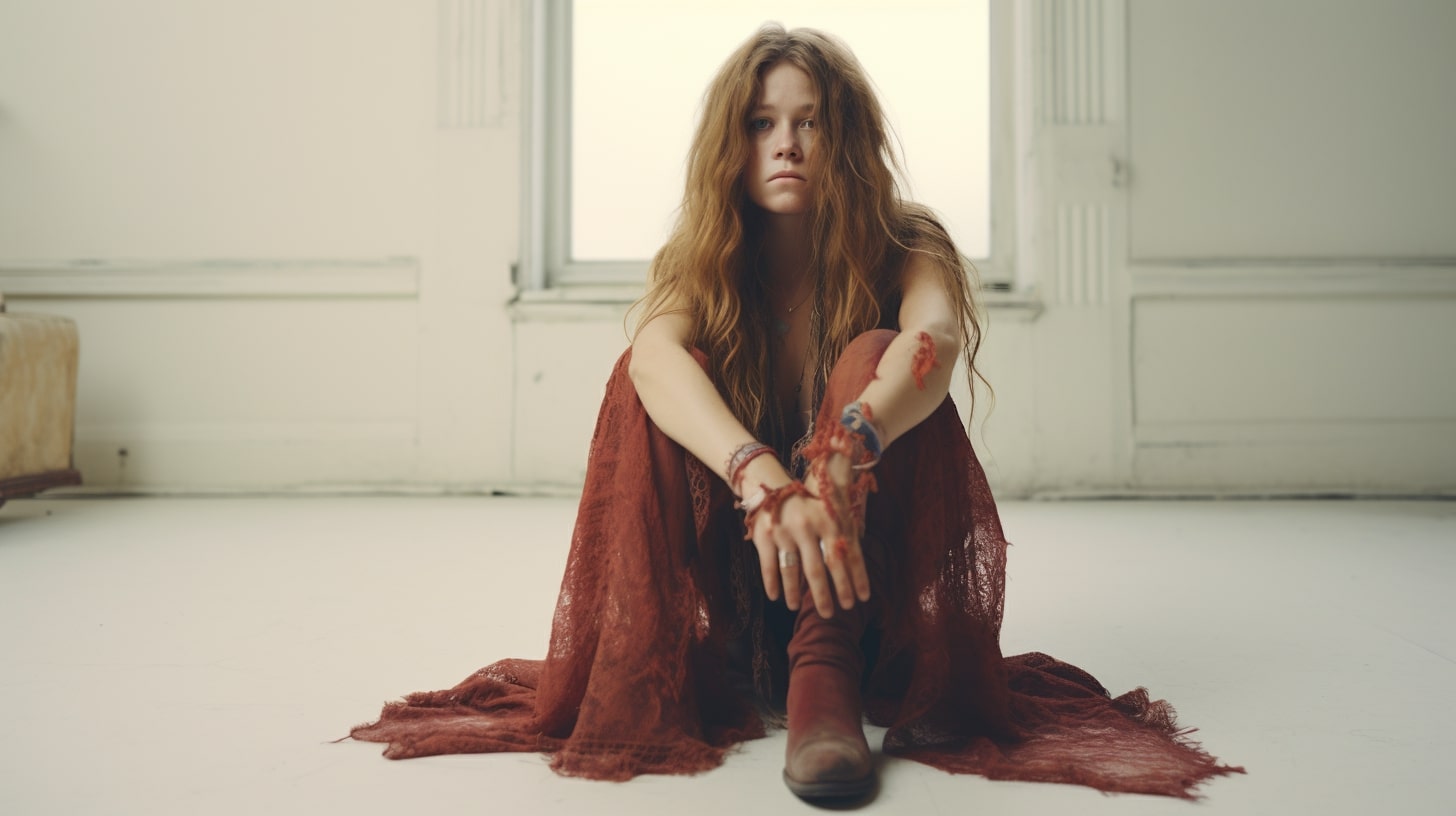Janis Joplin, an iconic American singer known for her powerful voice and expressive musical style, met a tragic end at the young age of 27.
As we explore the circumstances surrounding Janis Joplin’s death, it is important to consider the official cause and the factors that may have played a role in her passing. Although her life was cut short, Joplin’s legacy continues to inspire and influence musicians worldwide.
Contents
The Life and Career of Janis Joplin
Early Life and Influences
Janis Joplin was born in Port Arthur, Texas, on January 19, 1943. She developed a love for music at an early age, influenced by blues singers like Ma Rainey and Otis Redding. Joplin attended Lamar State College of Technology and the University, but her career didn’t take off until 1966.
Big Brother and the Holding Company
In 1966, Janis Joplin joined the San Francisco-based psychedelic rock band Big Brother and the Holding Company. The band gained popularity in the counterculture scene, playing alongside groups like the Grateful Dead and performing at events like the Monterey Pop Festival. Their 1968 album, “Cheap Thrills.”
Solo Career
After leaving Big Brother and the Holding Company, Janis Joplin went on to pursue a solo career. She formed the Full Tilt Boogie band and performed alongside well-known artists like Jimi Hendrix, The Doors, and Tina Turner. Joplin continued to make a name for herself in the rock and roll scene, captivating audiences with her powerful and emotional performances.
During her solo career, Joplin made appearances on popular television shows such as “The Dick Cavett Show” and interacted with influential figures like Allen Ginsberg.
Major Hits and Contributions to Music
Janis Joplin’s most significant contribution to music was her raw and uninhibited vocal style, which made her the premier white female blues vocalist of the 1960s. Some of her most well-known songs include “Piece of My Heart,” “Ball and Chain,” and “Me and Bobby McGee.” Joplin’s final album, “Pearl,” was released posthumously and included the hit single “Lasso.” Her performance at the 1967 Monterey Pop Festival and the famous Woodstock Festival in 1969 solidified her status as an icon of rock and roll.
Throughout her career, Janis Joplin broke barriers in the male-dominated music industry and left a lasting impact on the world of rock and roll. She remains an inspiration for countless artists and music enthusiasts to this day.
Janis Joplin’s Struggles with Substance Abuse
Drugs and Alcohol
Janis Joplin was no stranger to the world of drugs and alcohol, often using these substances to cope with the pressures of fame and the stress from her tumultuous personal life.
Her drug use included heroin, methamphetamine, and psychedelic substances. Joplin’s drinking habits were well-known, with alcohol being a constant part of her life even before she rose to fame. In addition, she was a heavy smoker, regularly seen with cigarettes in hand.
Impact on Her Life and Career
Substance abuse took a toll on Janis Joplin’s life and career. As her dependence on drugs and alcohol deepened, she started to experience damaging consequences. Her relationships suffered, with close friends like Peggy Caserta being drawn into the whirlwind of addiction alongside her. Joplin’s health deteriorated, leading to frequent illnesses and a weakened immune system.
The impact on her career was evident. Joplin’s performances became compromised, with inconsistency and lethargy taking over her once-vibrant presence on stage. In addition, recording sessions were often delayed or ruined due to her increasingly erratic behavior caused by substance abuse. Despite this, she managed to create unforgettable music, solidifying her reputation as a force in psychedelic rock.
Ultimately, it was Janis Joplin’s substance abuse that led to her tragic demise, as the cause of death was ruled as a heroin overdose, marking a tragic end to a life filled with talent, passion, and the struggle with addiction.
The Final Days and Death of Janis Joplin
Circumstances Surrounding Her Death
In the final days of her life, Janis Joplin stayed at the Landmark Motor Hotel in Hollywood, known today as the Highland Gardens Hotel. The famous rock and roll legend was discovered in her hotel room, Room 105, on October 4, 1970. The cause of her death was ruled as an accidental heroin overdose by medical examiner Thomas Noguchi.
Her death came as a shock to many in the San Francisco music scene and beyond. At the time, Joplin was at the peak of her career, having recently released her album “I Got Dem Ol’ Kozmic Blues Again Mama!”. Born in Beaumont, Texas, Janis Joplin attended Lamar State College of Technology before eventually moving to the West Coast and joining the vibrant music scene of Los Angeles and San Francisco.
Aftermath and Legacy
The untimely death of Janis Joplin propelled her into the infamous “27 Club,” a group of influential musicians who all tragically passed away at the age of 27. Other members of this unfortunate club include Jimi Hendrix, Brian Jones, and later, Kurt Cobain and Amy Winehouse.
Joplin’s legacy continues to be celebrated in various forms of media. The 2013 biopic “The Last of the Outlaws” stars Philip Seymour Hoffman as Joplin’s road manager, John Cooke. Furthermore, Dale Evans’ biography, “Going Down With Janis,” provides a firsthand account of Joplin’s life, including her time spent in the Haight Ashbury neighborhood of San Francisco.
In addition to her music, Joplin was known for her unique fashion sense, often donning a Southern Comfort bottle as a necklace and taking inspiration from the countercultural “hippie” style of clothing. Her love for fashion led her to open Mnasidika, a boutique in San Francisco, further solidifying her connection to the city.
In memory of her contribution to the music industry, the Los Angeles Times and various other publications continue to honor Janis Joplin’s life and impact on this day in history, reminding us of the tragic loss of a deeply talented musician.
Janis Joplin’s Cultural Impact and Lasting Legacy
Influence on Future Artists
Janis Joplin’s unique voice, style, and passion left an indelible mark on the music industry. Her appreciation of blues legends such as Bessie Smith, Lead Belly, Odetta, and Big Mama Thornton heavily influenced her sound. Joplin’s music inspired a broader audience to explore these classic artists, giving them newfound recognition and respect. Janis was known throughout her journey for her distinctive approach to music, transcending genres, and delivering heartfelt performances.
While studying at the University of Texas at Austin, Janis gained confidence and started to develop her stage presence. During her life, she formed connections with influential individuals, such as concert promoter Bill Graham, who supported her career. Joplin’s undeniable talent and unique sound made her touch the lives of many emerging artists who would later credit her as a significant influence.
Remembering Janis Joplin
Despite her untimely passing, Janis Joplin’s legacy lives on, and she continues to be remembered and celebrated for her contributions to music. As an emblem of her free-spirited persona, Joplin’s Porsche 356 became an iconic symbol for fans and enthusiasts worldwide. Several biographies and documentaries have been created in her honor, providing an in-depth look into her life, career, and experiences.
Off-stage, Janis was known for her love of the autoharp—an unusual instrument she used to incorporate into her performances and music, further showcasing her versatility and creativity. As an early adopter of technology, Joplin used recording devices to refine her craft, helping her develop her unique sound and musical style.
Janis Joplin’s enduring impact is evident in various lists and accolades, solidifying her status as a trailblazer and music icon. Her empowering message of personal freedom and equality remains relevant today, inspiring new generations to embrace change and express themselves through art.


